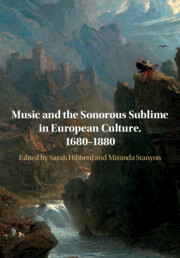Book contents
- Music and the Sonorous Sublime in European Culture, 1680–1880
- Music and the Sonorous Sublime in European Culture, 1680–1880
- Copyright page
- Dedication
- Contents
- Figures
- Musical Examples
- Acknowledgements
- Contributors
- Sonorous Sublimes: An Introduction
- 1 Thunder or Celestial Harmony: French Theological Debates on the Sonorous Sublime
- 2 ‘A Pleasing Rape’: John Dennis, Music and the Queer Sublime
- 3 The Idea of the Past in Eighteenth-Century British Music
- 4 C. P. E. Bach and the Neoclassical Sublime: Revisions of a Concept
- 5 Cherubini’s Médée and Sublime Vengeance
- 6 When Does the Sublime Stop? Cavatinas and Quotations in Haydn’s Seasons
- 7 Counterfeits, Contraltos and Harmony in De Quincey’s Sublime
- 8 The Consecration of Sound: Sublime Musical Creation in Haydn, Weber and Spohr
- 9 Commanding Performances: Opera, Surrogation and the Royal Sublime in 1848
- 10 Wagner’s Sublime Effects: Bells, Cannon and the Perception of Heavy Sound
- Bibliography
- Index
2 - ‘A Pleasing Rape’: John Dennis, Music and the Queer Sublime
Published online by Cambridge University Press: 30 April 2020
- Music and the Sonorous Sublime in European Culture, 1680–1880
- Music and the Sonorous Sublime in European Culture, 1680–1880
- Copyright page
- Dedication
- Contents
- Figures
- Musical Examples
- Acknowledgements
- Contributors
- Sonorous Sublimes: An Introduction
- 1 Thunder or Celestial Harmony: French Theological Debates on the Sonorous Sublime
- 2 ‘A Pleasing Rape’: John Dennis, Music and the Queer Sublime
- 3 The Idea of the Past in Eighteenth-Century British Music
- 4 C. P. E. Bach and the Neoclassical Sublime: Revisions of a Concept
- 5 Cherubini’s Médée and Sublime Vengeance
- 6 When Does the Sublime Stop? Cavatinas and Quotations in Haydn’s Seasons
- 7 Counterfeits, Contraltos and Harmony in De Quincey’s Sublime
- 8 The Consecration of Sound: Sublime Musical Creation in Haydn, Weber and Spohr
- 9 Commanding Performances: Opera, Surrogation and the Royal Sublime in 1848
- 10 Wagner’s Sublime Effects: Bells, Cannon and the Perception of Heavy Sound
- Bibliography
- Index
Summary
John Dennis, a founding father of the Longinian sublime in English literary culture around 1700, also wrote against male-male sodomy, then subject to moral panic, prosecution and hangings in London. This was more than coincidence: Dennis imagined the effects of the sublime on a (normatively) male reader in terms of sexual violence, ravishment and penetration. This chapter suggests a dialectical relationship between sodomy and the sublime. Rooting its argument in the critic’s homosocial literary context, classical pedigree, defence of the morality of the stage, and highly sensual theories of literary creation and reception, it unsettles the place of the sublime on the continuum of virtue and vice. Similarly, Dennis’s ambivalence towards music is explored in terms of sexual politics. A disunified and queer term in his writing, music lent penetrative force when in service to sublime literature (helping to ensure patrilinear continuity) but threatened to undo the male subject when taking the lead in Italian opera (through the performances of women and castrati). Such entertainments, Dennis warned, would lead to male-male marriages should their popularity continue. The prospects for a musical sublime in England in the lead-up to Handel’s arrival were mixed.
Keywords
- Type
- Chapter
- Information
- Publisher: Cambridge University PressPrint publication year: 2020

